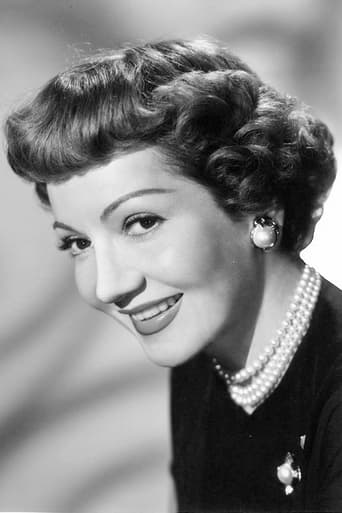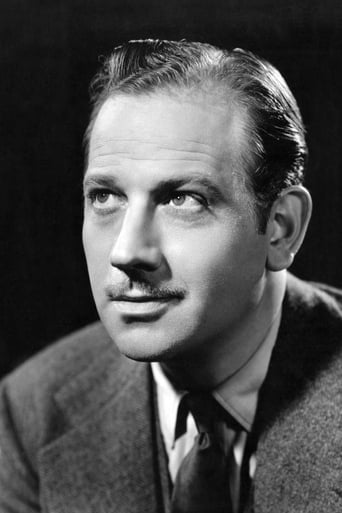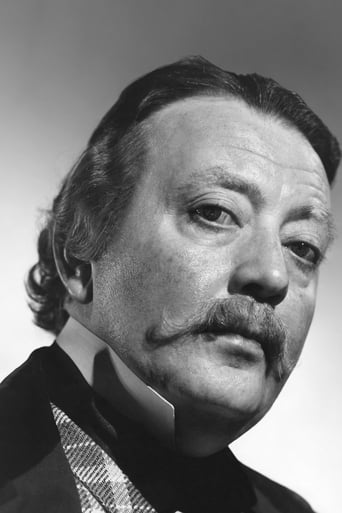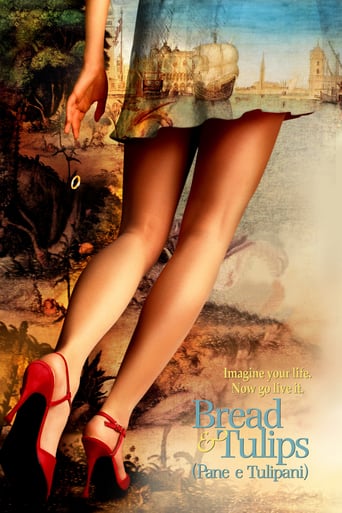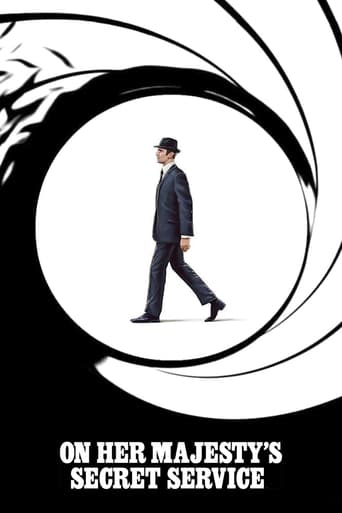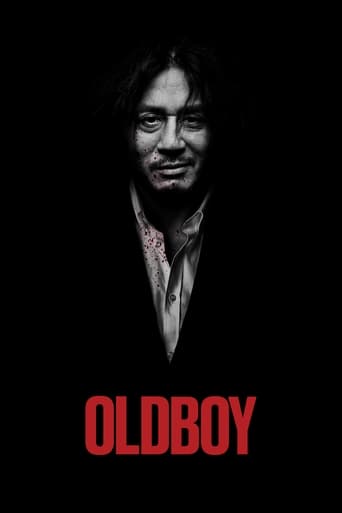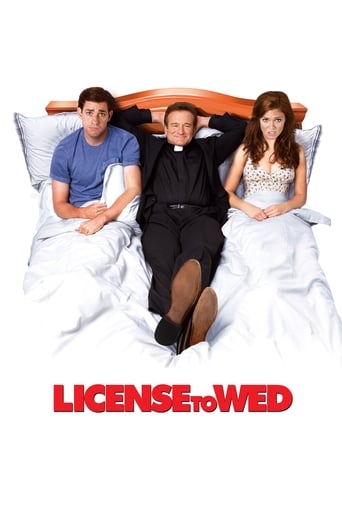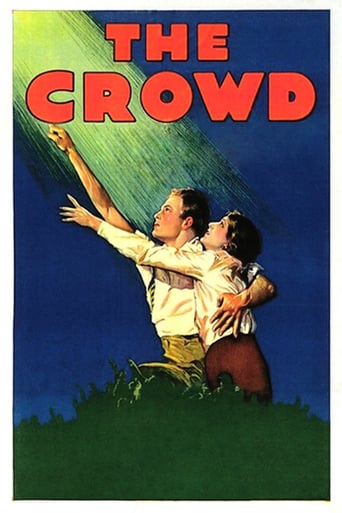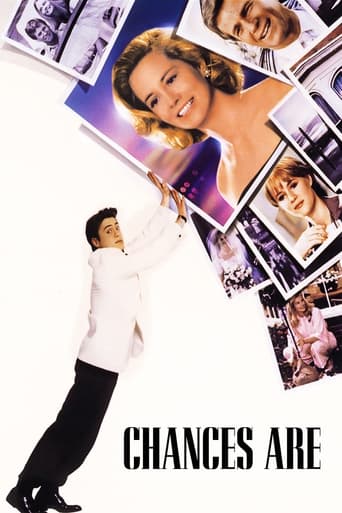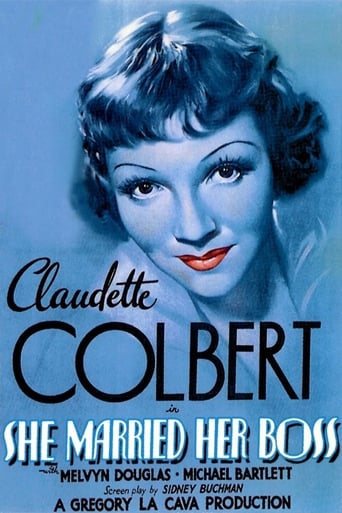
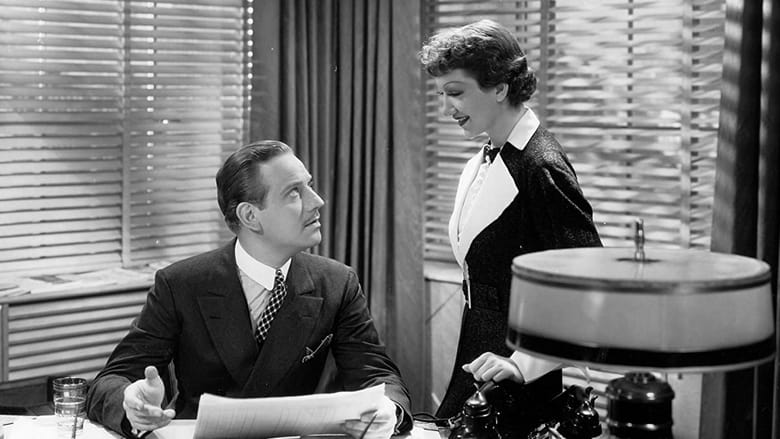
She Married Her Boss (1935)
A super-efficient secretary at a department store falls for and marries her boss, but finds out that taking care of him at home (and especially his spoiled-brat daughter) is a lot different than taking care of him at work.
Watch Trailer
Cast
Similar titles
Reviews
Very very predictable, including the post credit scene !!!
Simply A Masterpiece
In truth, there is barely enough story here to make a film.
This is a coming of age storyline that you've seen in one form or another for decades. It takes a truly unique voice to make yet another one worth watching.
Julia(Claudette Colbert)is a very competent executive secretary for her busy department store manager boss Richard Barclay(Melvyn Douglas). For 6 years they've made a great team. For 6 years, Julia has been waiting for Richard to ask her to marry him. But, he's shown zero romantic interest in this gorgeous, brainy, woman. For one thing, seems he had a very bad experience with his ex-wife, and is shy about getting into another relationship. But when Julia gets a job offer in Paris at double salary, he's finally persuaded to marry her (with no wedding party frills) to avoid losing her help at the office. But, Julia has other ideas about what kind of life she wants as a married woman. She wants to be a pampered 'stay-at-home' wife and mother rather than continue the hectic life of a career woman.. At first, Richard argues against her idea. But when she's about to run off with a business associate, he gets drunk(along with the butler), and tells her she's going for a little ride(said with the suggestion of an ominous outcome). The drunk butler/chauffeur weaves through city traffic to a destination where they pick up a few bricks. She suggests they are going to weigh her down in a river drowning. Actually, they have another purpose for the bricks in the whirlwind finish, which I will let you find out for yourself. The majority of the humor relates to Richard's bratty half-grown daughter Annabel(Edith Fellows). At first, she hates Judith and her unfamiliar ways. But, eventually, she comes to love her, and cries when she says she's running off with another man who treats her more like a woman than a work associate. If you remember "Bright Eyes", with Shirley Temple, you will remember Jane Withers playing Shirley's very bratty playmate as being very similar to Annabel. However, Annabel has no playmate to vent her anger and tricks on, except her cute little dog, Fluffy. Richard's spinster sister, Gertrude(Katharine Alexander), who has been taking care of the house and Annabel has to get used to being second in command in the household. As an example of their sometimes conflicts, Gertrude pulls the drapes closed by day so the sun doesn't fade the carpets. Julia then opens the drapes, saying people need some sunshine, and drapes can eventually be replaced. It's clear that both Gertrude and Richard have been too soft on Annabel, and have no idea how to play with her to make her happy. Gertrude says she hopes the marriage will fail, as it leaves no role for her if Julia doesn't work outside the home.Raymond Walburn, the butler/chauffeur, usually played somewhat comical characters, his 'bug eyes' facilitating his often bumbling mannerisms.....Jean Dixon plays Julia's scheming friend.... It's a rare film including Claudette that I don't take a liking to. This one is not her best, but it's not bad. See it on YouTube. in B&W, of course.
First, I must respectfully disagree with one reviewer here who kept describing the film as a screwball comedy. Even in the 1930s, every comedy was not a screwball comedy, and this isn't one (despite one kinda goofy car episode). It's not a drawing room comedy either. It's simply a domestic comedy...in fact, is it really a comedy. Let's see, you have an obsessive boss that has no real personal life, a sister that's a terrible prude and suppresses any family joy in life, a young daughter who is so unhappy that she's become a terrible brat, a young lady (Colbert)who has her eyes on her boss but then finds herself in an unsatisfying marriage, and a little girl who then pines because the stepmother who has brought some joy into her life then leaves home. In many ways, this is a pretty serious story -- with some comedic moments.Several reviewers have wondered why the Colbert character is interested in the Melvyn Douglas boss character to begin with. A fair criticism. The screenwriters and director sure haven't given us much of a clue about that. But how many of us have found ourselves in an unfulfilling relationship or marriage, ultimately realizing we made a mistake. And I tried to remember that this film was made in 1935. Films were not always very sophisticated back then...they were slowly growing up...and the story here is certainly more sophisticated than many other films from the same time.Claudette Colbert is quite good here, though obviously not quite as well developed as an actress as she was in the 1940s. Melvyn Douglas was good in the role he played, although it's rather hard to like that role. Two standout performances were 12-year-old Edith Fellows as Douglas' bratty daughter (who develops into a rather nice child once the home situation improves), and Raymond Walburn as Douglas' butler (the scenes of Douglas and Walburn in a drunken state were among the better drunk scenes I've seen).If you see this movie for what it is -- a drama story with comedy overtones -- you'll really enjoy it. It's far better than many other mid-30s productions...and 1939 was just around the corner.
I've read the other comments that talked about aspects of this film that are dated, offensive, or just plain bizarre. I was rather surprised that no one brought up the movie's cringe-inducing gender stereotypes. Anyone who has seen Claudette Colbert or Melvyn Douglas in the films they made before the introduction of the Production Code(in mid-1934) would immediately recognize the heavy hand of the censors, who did their best to impose on Hollywood their narrow-minded idea of "family values." (On the basis of this film, it would appear that allowing married women to pursue a career would bring about the end of American society, but child abuse and drunk driving are just good clean fun!) Though the cast and plot look good on paper, the result is strained and uneven, as if the script had been written to Pre-Code standards and then hastily cleaned up so as not to offend the censors.Claudette Colbert plays Julia Scott, a bright, capable, and confident executive assistant at a large department store. She runs the busy office like a well-oiled machine and clearly enjoys the work. It's hard to fathom why she's spent six years mooning over her boss, Richard Barclay. The way the role of Barclay is written, the usually charming Melvyn Douglas comes off as a humorless, sexless cipher. All the more jarring, then, to hear Julia talk about her desire to give up her terrific job and marry Barclay. Without a trace of irony, she describes marriage as "a woman's REAL career." Okay, she wants to get married. But why on earth would the lovely and vivacious Julia want Barclay as a husband? Not only is he dull as ditch-water, he treats her as if she were a piece of super-efficient office equipment. Once they're married, he ridicules her for assuming the stereotypical role of housewife, despite the fact that she's set his chaotic home in order and tamed his obnoxious brat of a daughter. There's nothing in the movie to explain Barclay's eventual change of heart; apparently it's brought on by a quart of whiskey. So much for good old "family values." The film is so devoid of any hint of sexual attraction that we don't see a single cuddle or smooch--not even at the very end when it's clear that the newlyweds will finally get around to doing what newlyweds are famous for doing. Julia has more physical contact (and chemistry) with Leonard Rogers, her sweet-tempered playboy suitor, who's a lot more appealing as husband material than that cold fish Barclay.Solid performances are turned in by familiar actors in some of the secondary roles: Raymond Walburn as the perfect butler; Katherine Alexander as Barclay's drama-queen sister; Edith Fellows as the evil daughter; and especially Jean Dixon as Julia's wise-cracking, matchmaking best friend.Would love to have seen this film made just a year earlier, before the Hays Office started taking their moralizing hatchet to so many of the things that made movies of the 30s worth watching.
I used to deal in old-movie memorabilia. In the 1960s, while running a stall in the Portobello Road, I acquired and resold a full-colour poster for 'She Married Her Boss'. What a bizarre piece of artwork! The poster depicted Claudette Colbert with blue eyes, blue hair, and blue skin: she looked a proper Smurfette, or perhaps an Oompa-Loompa. Worse luck, the blue Colbert was placed against a background in the same shade of blue, making her seem to vanish altogether ... except for her lips, which were bright red. For decades, I wanted to view this movie to find out if it was as weird as the poster art.It turns out to be even weirder. Who designed the costumes here? In the opening scene, Colbert wears a dress with some nice gauntlet cuffs, but it also has a titchy little bow-tie and a pair of lapels the size and shape of an aircraft carrier. In a later scene, Jean Dixon wears an outfit with what appears to be a springboard jutting out of her left shoulder. In the final sequence, Colbert sports raccoon shoulder pads that are so enormous she looks like a linebacker.This is a screwball comedy, but it's screwier than it needs to be. Michael Bartlett plays a lounge lizard who charms Colbert by telling her she ought to have a mole on her chin. (Ugh!) You know those horribly phony camera set-ups in which an actor sits at a piano keyboard, pumping his elbows, and we're expected to believe he's playing? Bartlett does that here, in one of the fakest versions I've ever seen.On the positive side, there's a stand-out performance by 12-year-old Edith Fellows as a spoilt brat. Fellows was an immensely talented child actress who had the misfortune to be much less pretty than Shirley Temple, so she got lumbered with Virginia Weidler roles. Colbert hauls Fellows offscreen and gives her a spanking, which would have been funnier if shown on screen. I was delighted by the performance of Raymond Walburn as Melvyn Douglas's butler: amiable, loyal and eventually drunken. Walburn usually played blustering shysters or roguish criminals, so it's a pleasure to see him given this change of pace. Grace Hayle, a character actress whose heavy physique usually cast her in buffoonish roles, is personable here in a nice bit role as Colbert's assistant.Although the plot is unbelievable (even by screwball comedy standards), individual set pieces are delightful and funny. Colbert and Bartlett host a cocktail party in the shop window of Douglas's department store, with shop dummies as the guests.The climax of the movie is meant to be funny and romantic, but I found it saddening and maddening. Douglas pretends to abduct Colbert at gunpoint: we know he's faking, but she doesn't and she's evidently terrified. Douglas and Walburn, both drunk to the eyebrows, take Colbert speeding through the city in Douglas's motorcar, the stonkered Walburn at the wheel whilst an undercranked camera shows the car speeding wildly through the streets. I can laugh at comedy based on drunkenness, but it stops being funny when the drunks grab a steering wheel: there have been so many drink-driving tragedies, I just can't laugh at the notion of an inebriate operating a car.Talking of booze: this movie was directed by Gregory La Cava, a hugely talented and under-rated director who ruined his career through alcoholism. Maybe I'm reading too much into this, but quite a few of La Cava's films -- including this one -- depict characters who solve their problems by getting drunk. I'll rate 'She Married Her Boss' 7 out of 10, but I wish someone could explain this movie's weird Smurfette poster and those ridiculous costumes.
